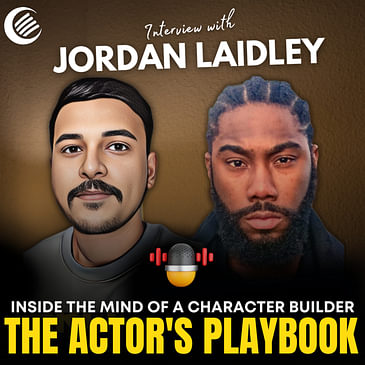Actor Jordan's remarkable story in our latest podcast episode, where we peel back the layers of an artist who was thrust into the world of acting and emerged as a force of creative energy.
From the reluctant beginnings to the transformative power of drama school and beyond, Jordan's narrative is a compelling tale of growth, challenge, and the relentless pursuit of artistic truth.
🎬 Episode Highlights:
- Explore Jordan's unexpected foray into acting and how it shaped his future
- Follow the rigorous path through training and drama school that honed his craft
- Delve into Jordan's meticulous character prep process and his versatility across stage plays, TV, and film.
📝 Insights You Can't Miss:
- Gain an insider's view of Jordan's scriptwriting process and how he addresses themes like knife crime and gang culture.
- Discover the unique blend of improv rapping that showcases Jordan's belief in the use of creative energy.
- Be inspired by the most rewarding moments of Jordan's career and his valuable advice for aspiring artists.
Listen actor Jordan Laidley in "The Knights of Avalon".
TIME STAMPS
00:00 Coming Up Next
02:29 Jordan's Schedule and Projects
04:21 Jordan's Childhood
05:33 Jordan was forced into Acting!
07:38 Shifting Focus Forward Acting
10:33 Training and Drama School
13:18 First Dramatic Call-back
17:02 Jordan's Character Prep Process
20:10 Stage Plays, TV & Films
22:55 How to Keep Character Alive
27:46 Power of IMPROV
30:52 Jordan's Script Writing Process
34:19 Knife Crime and Gang Culture
41:11 Improv Rapping
44:31 Why Artists Must Use Creative Energy ?
52:39 Most Rewarding Moments
55:09 Valuable Advice for Artists
58:51 Thank you Jordan
Listen n Download FREE YOUR FAV STORIES :
Romance : https://creativeaudios.in/romance
Adventure : https://creativeaudios.in/season/23
Super Hero : https://creativeaudios.in/superheroes
Spiritual Stories : https://creativeaudios.in/spiritualstories
Crime & Mystery https://creativeaudios.in/crime-and-mystery
Sherlock Holmes : https://creativeaudios.in/season/7
Christmas stories : https://creativeaudios.in/season/25
Arabian Nights : https://creativeaudios.in/season/5
Adventures of Sinbad : https://creativeaudios.in/season/23
Freedom Fighters : https://creativeaudios.in/indianfreedomfighters
Hindi Stories : https://creativeaudios.in/hindi-kahaniyaan
Interviews with Global Artists : https://creativeaudios.in/season/26
Follow on Facebook page https://www.facebook.com/podcastaudios/
Follow us on Instagram https://www.instagram.com/podcastaudios/




